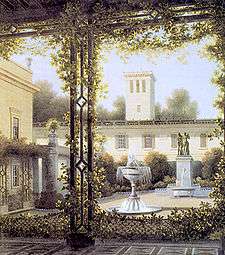Glienicke Palace
| Glienicke Palace | |
|---|---|
| Schloss Glienicke | |
 Glienicke Palace | |
 Location in Germany | |
| General information | |
| Type | Palace |
| Architectural style | Neoclassical |
| Town or city | Berlin |
| Country | Germany |
| Coordinates | 52°24′50″N 13°05′42″E / 52.414°N 13.095°E |
| Client | Carl of Prussia |
| Owner | Stiftung Preußische Schlösser und Gärten Berlin-Brandenburg |
| Design and construction | |
| Architect | Karl Friedrich Schinkel |
| Website | |
| Stiftung Preußische Schlösser und Gärten | |
Glienicke Palace (German: Schloss Glienicke) is a palace located on the peninsula of Berlin-Wannsee, Germany. It was designed by Karl Friedrich Schinkel for Prince Carl of Prussia in 1826.
Location
The palace is situated near the Glienicke Bridge, on the Bundesstraße 1 across from the Glienicke Hunting Lodge. To the north is Volkspark Glienicke.
History
It was designed by Karl Friedrich Schinkel for Prince Carl of Prussia in 1826. The building, originally merely a cottage, was turned into a summer palace in the late Neoclassical style. Particularly striking are two golden lion statues in front of the frontage, which were also designed by Schinkel. The lions are versions of the Medici lions from the Villa Medici. In the palace are antique objets d'art, which the Prince brought back from his trips.
World Heritage Site

Since 1990, Glienicke Palace and the park have been part of the UNESCO World Heritage Site "Palaces and Parks of Potsdam and Berlin". The palace is administered by the Stiftung Preußische Schlösser und Gärten Berlin-Brandenburg. The palace's park is now called the Volkspark Glienicke.
See also
References
External links
| Wikimedia Commons has media related to Parklandschaft Klein-Glienicke. |
Coordinates: 52°24′51″N 13°05′43″E / 52.41417°N 13.09528°E